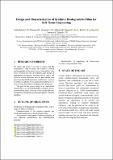| dc.contributor.author | Ribeiro, Sofia | |
| dc.contributor.author | Fernandes, Emanuel | |
| dc.contributor.author | Gomes, Manuela | |
| dc.contributor.author | Reis, Rui | |
| dc.contributor.author | Bayon, Yves | |
| dc.contributor.author | Zeugolis, Dimitrios I. | |
| dc.date.accessioned | 2020-04-24T12:09:31Z | |
| dc.date.available | 2020-04-24T12:09:31Z | |
| dc.date.issued | 2019 | |
| dc.identifier.citation | Ribeiro, S.; Fernandes, E.; Gomes, M.; Reis, R.; Bayon, Y. and Zeugolis, D. (2019). Design and Characterization of Synthetic Biodegradable Films for Soft Tissue Engineering.In Doctoral Consortium - Volume 1: DCBIOSTEC, pages 28-32 | en_IE |
| dc.identifier.uri | http://hdl.handle.net/10379/15908 | |
| dc.description.abstract | To repair soft tissue, it is vital to ensure that the biomaterial is able to mimic the complex elasticity of the native tissue. Substrate stiffness has a huge influence on cell physiology and behaviour. The present study presents a set of polymeric films as initial support matrix of cells. A range of synthetic biodegradable polymers was selected according to the physico-chemical intrinsic properties of aliphatic polymers. They have similar chemistry (absorbable polyesters made from lactic acid, glycolic acid, trimethylene carbonate, dioxanone & β-caprolactone), however show different mechanical and degradation properties. The films were manufactured by thermal presser and then characterized by scanning electron microscopy, differential scanning calorimetry, nuclear magnetic resonance spectroscopy and Fourier transform infrared spectroscopy. The mechanical properties of the films were assessed by uniaxial tensile tests in wet conditions and also by atomic force microscopy. In vitro as says were performed to assess the cell cytocompatibility, proliferation and differentiation potential of the films. The mechanical properties of the materials are within the range intended for musculoskeletal tissue repair. Biological assays showed good cell adhesion, cell proliferation and cell viability. In the future, the combined effect of stiffness and topography will be assessed on cell phenotype maintenance. | en_IE |
| dc.description.sponsorship | "This project has received funding from the European Union's Horizon 2020 research and innovation programme under the Marie Sklodowska-Curie grant agreement No. 676338" (Ref: email from Oonagh Dwane 22/05/2020) | |
| dc.format | application/pdf | en_IE |
| dc.language.iso | en | en_IE |
| dc.publisher | SciTePress | en_IE |
| dc.relation.ispartof | Doctoral Consortium Volume 1: DCBIOSTEC | en |
| dc.rights | Attribution-NonCommercial-NoDerivs 3.0 Ireland | |
| dc.rights.uri | https://creativecommons.org/licenses/by-nc-nd/3.0/ie/ | |
| dc.subject | biodegradable polymers | en_IE |
| dc.subject | polymer blends | en_IE |
| dc.subject | substrate stiffness | en_IE |
| dc.subject | mechanical properties | en_IE |
| dc.subject | musculoskeletal regeneration | en_IE |
| dc.title | Design and characterization of synthetic biodegradable films for soft tissue engineering | en_IE |
| dc.type | Conference Paper | en_IE |
| dc.date.updated | 2020-04-23T18:49:28Z | |
| dc.local.publishedsource | https://www.scitepress.org/PublicationsDetail.aspx?ID=pB2/6YQLcKc=&t=1 | en_IE |
| dc.description.peer-reviewed | Not peer reviewed | |
| dc.contributor.funder | Horizon 2020 | |
| dc.internal.rssid | 20747098 | |
| dc.local.contact | Sofia Ribeiro, Biomedical Sciences Building, Nui Galway. Email: s.ribeiro2@nuigalway.ie | |
| dc.local.copyrightchecked | Yes | |
| dc.local.version | ACCEPTED | |
| dcterms.project | info:eu-repo/grantAgreement/EC/H2020::MSCA-ITN-ETN/676338/EU/Engineering in vitro microenvironments for translation of cell-based therapies for tendon repair/Tendon Therapy Train | |
| nui.item.downloads | 124 | |


